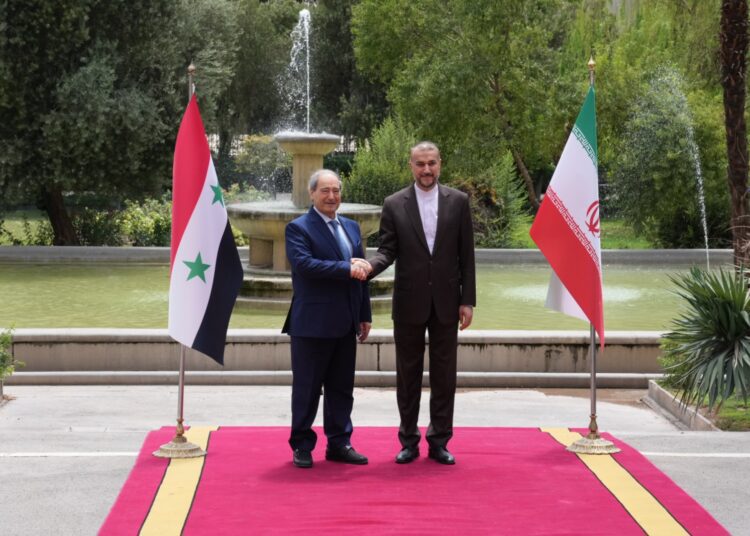Iranian and Syrian foreign ministers met in Tehran today on Monday, July 31. This meeting unfolds another chapter in the ongoing saga of Iran-Syria relations, signaling a new dawn in political and economic alignment. The trip heralds the arrival of Syrian Foreign Minister Faisal Mekdad, flanked by his counterparts in Foreign Trade, Communications, and a cohort of mid-level officials.
This diplomatic exchange seems to follow in the wake of recent bilateral discourse between Syria and Iran, aimed at rectifying inadequacies in economic cooperation. Sources in Syria attest that the delegation will pursue the implementation of the previously agreed road map, a byproduct of the Iranian President’s visit to Damascus.
Iranian government, post-Syrian conflict, has been a target of criticism by observers in Iran, with contentions centered on the apparent discrepancy between the heavy financial, human and military toll expended in the Syrian war against ISIS and the yield extracted from the Syrian market. The reestablishment of Syria’s diplomacy with Arab nations, rival to Iran, has amplified this narrative. The normalization of Turkey-Syria relations is seen as another tightening of the noose around Iran’s opportunities in Syria.
Signed into existence during President Ebrahim Raisi’s stay in Syria this past May were 15 cooperation documents that bring together Tehran and Damascus in various sectors. The documents reflect commitments to collaborative efforts in trade, oil, energy, technical and engineering endeavors, housing, transportation, free zones, communication technology, and disaster management.
Expert counsel urges the Iranian government to amplify the role of their private sector in Syria’s reconstruction. Commerce, residential construction, urban service projects, and large governmental initiatives all stand as domains wherein Iran-Syria ties could find increasing economic value. Yet, critiques linger of insufficient governmental support for Iran’s private sector participation in Syria’s recovery.
Assistance in Syria’s reconstruction, attributed to active government diplomacy and the freedom of action of private sectors, outmatches Iran’s modest contribution. Some view Syrian reticence as the culprit, while others attribute the imbalance to a lack of enthusiasm within the Iranian private sector. In spite of existing Iran-Syria contracts in oil, energy, and mining, Iran is yet to capitalize fully on these agreements.
Russia, courtesy of its military presence, partakes in significant Syrian projects including Tartus port development, oil and gas explorations in the Mediterranean, and mineral extraction – surfacing as a significant collaborator. Similarly, China has struck initial agreements for Syria’s entry into the expansive Belt and Road project.
The engagement between Faisal Mekdad and Hossein Amirabdollahian further acts as a testament to the joint-strategies between the two nations, as witnessed recently on the sidelines of the Non-Aligned Movement assembly in Baku. Mekdad’s visit to Iran in the past two years underscores Syria’s commitment to fostering diplomatic relations.






